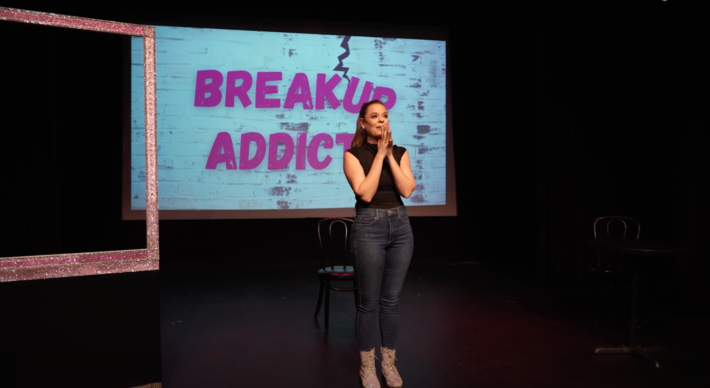By Dominic Mucciacito
Addiction is a term that does not seem to have the same cultural cache it once had. At some point in the last decade (coinciding with the advent of social media) to admit to an addiction usually meant that a PR Manager had written a public apology and was looking to deflect the blame from the act of aberrant behaviors to the cause of the abhorrent behavior.
Yes, everyone exhibits addictive behavior but nobody wants to be labeled as an addict.
Paige Wilhide’s solo show the “BREAKUP ADDICT’, Seen at the Zephyr Theatre on July 8, 2023, bravely crosses that threshold before she even takes the stage. In fact, the program devotes an entire page to the twelve characteristics of sex and love addiction.
BREAKUP ADDICT, which Wilhide also wrote, is an autobiographical story of recovery told from the perspective of the polymorphic voices within. Think Pixar’s INSIDE OUT’ but centered on romantic dependency instead of puberty.
Wilhide throws herself at you in sections; sometimes addressing the audience with the voice of a prissy inner intuition, other times in the higher pitched Valley Girl cadence of her addiction. The voices compete for attention, laughs, the inducement of cringes and a melange of all three.
Later when the character of Grief arrives, Wilhide shares a childhood trauma that might have sent her down the path of her love addiction. For some reason she voices Grief with a cliched New Jersey garbage disposal accent from a Sopranos parody which undercuts the vulnerability of the reveal. Having laid the foundation of an emotional investment she softens the impact of the play’s weight at the moment when it might have hit the hardest.
Still you have to admire her for putting so much of herself into the text.
Wilhide’s personal journey towards recovery after bottoming out with two stillborn “relationships” is played for laughs, but she plants some incisive truths at the corners of her expansive smile: these “relationships” deserve quotations is a testament to how low her definition of the term has fallen, but you have to see the show to appreciate that.
The stage notes mention a real world breakup in 2016, but the degree of autobiographical authenticity in the show is best kept ambiguous. What lingers is the fact that we handicap our relationships by being unwilling, or unable to do the hard work of loving ourselves.
“Healing doesn’t happen through avoidance and resistance. Healing happens when you take time to look inward, look at the wound and get curious about it.” Wilhide, also an empowerment coach, said in an Instagram post.
Doing the same thing repeatedly and expecting different results is textbook insanity, so she decides to pivot. In the show she starts attending 12-step meetings for love addiction. She tries quitting cold turkey on men. Raised Jewish but a confessed agnostic, she finds belief in a power greater than herself. She gives Her a name (Flo) and a syrupy Southern drawl irradiated with unconditional love. Flo seems like the type who hugs strangers the first time that they meet.
Speaking of hugs, the show has one more character to introduce into Paige’s psyche before its conclusion: sisterhood. This feminine energy that nurtures and forgives is a self discovery that initially shocks Wilhide’s character as she has spent a lifetime competing with them for the attention of men.
The relief that sisterhood offers her is one that the play suggests she has been trying to fill since she was a toddler. It is the one that Wilhide seems the most proud of in the story of her life. Being single, for both men and women, into our thirties and forties does not have to be an albatross. It can be a badge of honor if you know what your worth is.
THE BREAKUP ADDICT will be performed once more locally at the end of the month before the show heads across the pond for a run at the Edinburgh Fringe in Scotland. A date and time for the encore at the Whitefire Theatre in Los Angeles has not yet been announced.

